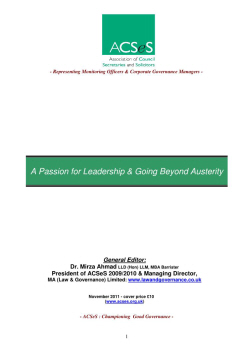Redefining service delivery
- Details
How can local authority legal teams make a contribution to savings while maintaining standards of service? Sanjay Prashar outlines some of the key strategies for coping with the cuts.
The same local government landscape which has been characterised over the last decade by a plethora of government-led performance initiatives such as best value, CPA and CAA is now ravaged by a period of austerity which is unprecedented.
In-house legal teams, far from being immune from this austerity, have to make their contribution to meeting the challenge of providing more for less.
Retaining the status quo in how we deliver our services is no longer an option. However, necessity as they say is indeed the mother of invention and the need for creativity and innovation in service design is leading to the development of alternative delivery models for the provision of legal services.
Amongst these, shared services have become the vogue, with the creation of a joint legal service between the London Boroughs of Richmond and Merton, a prominent example of authorities taking the plunge in this way.
The benefits of the shared service approach have been set out in numerous publications and commentaries over the last 12 months and beyond. These benefits are self-evident, and where such arrangements are predicated upon a proper process of due diligence, they no doubt have their place in informing future trends.
However, there may be political and structural reasons as to why a shared service approach is not suitable for your authority. In such instances it is the application of your leadership skills which will be a key determinant of whether or not your service emerges from the current period of austerity as a fit for purpose entity. Indeed, the current local authority environment calls for the Head of Legal to work the leadership oracle with unprecedented vigour.
One approach to this is to give separate consideration to the strategy, structure and systems of your service.
Strategy
Speak to your senior clients. Establish what they want from the legal service in the coming months and years. Agree priorities and focus on delivering these. If you are being required to reduce your budget, then this must be offset by an effort to manage demand.
Whilst it is not in any authority’s interests for demand to be simply shifted across the organisation, there are certain areas of legal activity which no doubt lends themselves to client responsibility. A discourse with senior client managers may also help achieve behavioural change amongst clients so that legal advice is only sought having prior regard to both the risk of not doing so, and the value which such advice can properly add to the decision-making process.
The culture of “hand-holding”, which is perhaps most prevalent in the area of social work will need to be negated. Clients will need to act as commissioners of your service and in so doing, have an important role to play in managing demand.
Structure
Having identified your key areas of priority, your structure will need to be in harmony with them – i.e. you need to create a strategy-structure fit.
You will need to ask whether you have the right people in the right places, doing the right things. This may involve a re-evaluation of your management structure, and a more forensic synchronisation of workflows against staff competences. This process will unavoidably involve having to make difficult and at times painful decisions. Systems
Systems
“There is nothing as useless as doing something efficiently which needn’t be done at all.” This timeless aphorism, attributed to the management guru Peter Drucker admittedly retains some resonance in the bureaucracy that is local government. To avoid this pitfall it would be prudent to examine each element of your systems having regard to activities such as:
· Meetings
· Administration
· Case management
· Performance reporting
· Training and development
Establish what can be done quicker, with fewer resources or not at all without adversely impact on the quality of your service. Your staff are critical to this process so ensure that they are fully engaged.
To succeed in navigating your service through the change agenda it is imperative that you reject the well-worn grooves of the past and recognise that the in-house legal team of the future is one which must re-calibrate itself against the changing landscape of local government and ensure that its relevance is not lost. Financial prudence and Performance management will be key to the achievement of your goals.
Sanjay Prashar is Executive Head of Legal & Democratic Services at the London Borough of Sutton
This article first appeared in 'A Passion for Leadership & Going Beyond Austerity, published in November 2011 by the Association of Council Secretaries and Solicitors (ACSeS).
To order or download a copy from the ACSeS website, please click here.
Legal Adviser
Regulatory/Litigation Lawyer
Deputy Director Legal and Democratic Services
Governance Lawyer
Legal Director - Government and Public Sector
Locums
Poll


















